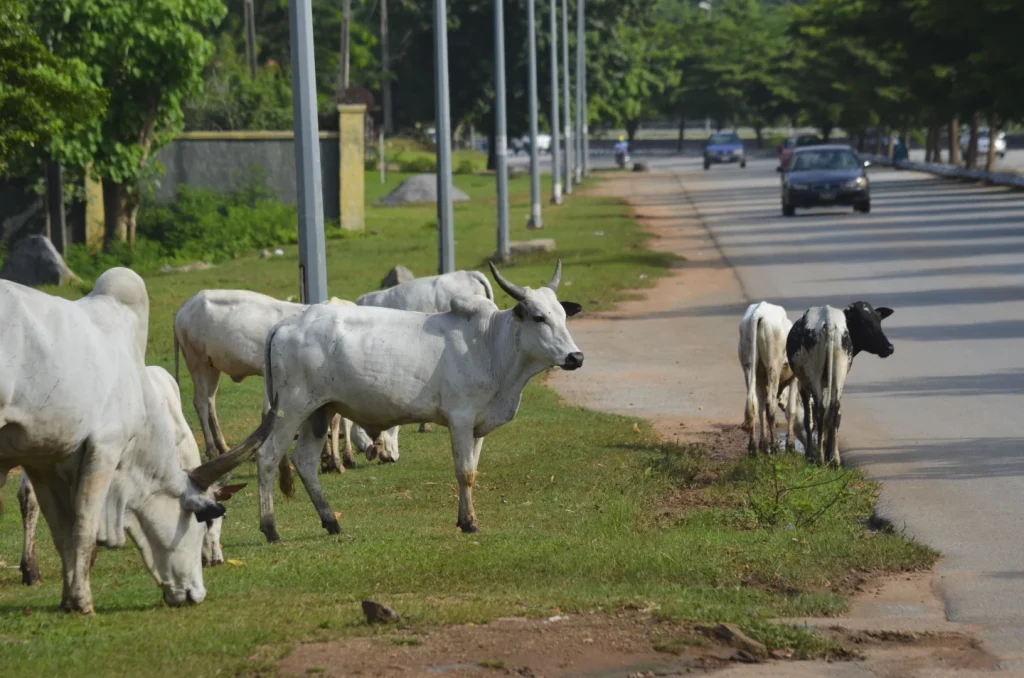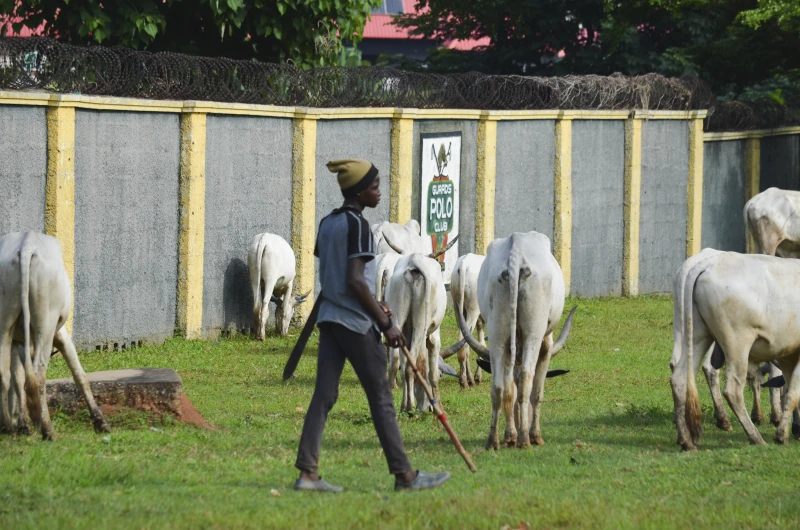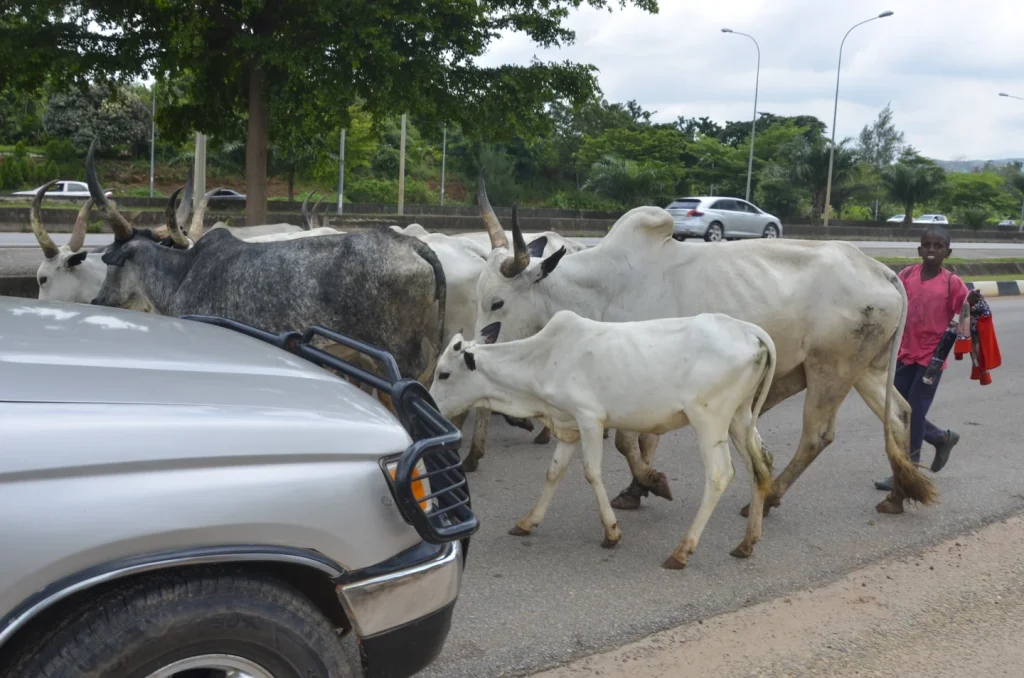In the bustling capital of Nigeria, Abuja, a striking scene unfolds daily at an intersection seven miles from the presidential villa, where the clattering hooves of a herd of cattle disrupt the flow of urban life.
Frustrated drivers, ensnared in traffic, honk their horns as they witness a teenage herder, Ismail Abubakar, guiding his cattle across the road in search of grazing land.
This scenario is emblematic of a broader struggle faced by Fulani herders in Nigeria, who find themselves navigating the complexities of a rapidly modernizing society that is encroaching upon their traditional way of life.
Abubakar’s journey from the pastoral lands of Katsina State to the urban sprawl of Abuja is a poignant reflection of the challenges posed by climate change, urbanization, and the socio-economic pressures that are reshaping Nigeria’s landscape.
The Fulani people, traditionally nomadic herders, have long dominated West Africa’s cattle industry. Their lifestyle, which relies on the availability of vast grazing lands, is increasingly threatened by a combination of factors, including climate change, population growth, and the relentless push for urban development.
Abubakar’s family, like many others, has been forced to abandon their ancestral grazing lands due to the desertification exacerbated by changing climatic conditions.
The once fertile fields of Katsina have succumbed to aridity, compelling families to migrate to urban areas in search of pasture. This migration, however, has not been without its challenges.
In Abuja, the rural area of Idu, where Abubakar and his family initially settled, has transformed dramatically over the years. What was once a bushy expanse suitable for grazing has been replaced by housing estates and industrial complexes.
The encroachment of urbanization has not only displaced herders but has also rendered traditional grazing practices increasingly untenable.
Abubakar’s lamentation regarding the destruction of their settlement highlights the harsh reality faced by many Fulani families: the need to adapt to a changing environment while grappling with the loss of their traditional lands.
The plight of the Fulani herders is further compounded by a lack of governmental support and infrastructure. Baba Ngelzarma, president of the Miyetti Allah Cattle Breeders Association of Nigeria, articulates the frustration felt by many in the community.
He notes that the government’s failure to provide adequate resources, such as designated grazing reserves with essential infrastructure, has left herders scrambling for survival.
The government has made promises to address these issues, including the establishment of a new livestock development ministry aimed at reviving abandoned grazing reserves.
However, the absence of appointed leadership and concrete action raises questions about the sincerity and efficacy of these initiatives.
The challenges faced by the Fulani herders extend beyond mere access to land. As the cattle industry struggles to meet local demand—despite Nigeria’s substantial cattle population—inefficiencies arise from the stress placed on cattle that are forced to move constantly in search of grazing opportunities.
This situation not only affects the health and productivity of the livestock but also has broader implications for the nation’s economy.
With nearly 90% of local dairy demand being met through imports, the inefficacy of the domestic cattle industry is a troubling indicator of the systemic issues plaguing the sector.
The intersection of urban life and traditional herding practices in Abuja presents a unique set of challenges. As herders like Abubakar navigate the city in search of pasture, they inadvertently contribute to traffic congestion and urban disruption.
The sight of cattle wandering through busy streets is a stark reminder of the tensions between the pastoral lifestyle and the demands of modern urban living.
The frustration of drivers caught in traffic is indicative of a larger societal issue, where the needs of an ancient way of life clash with the realities of contemporary urbanization.
Moreover, the issue of land access has led to violent conflicts in various regions of Nigeria, particularly in central and southern areas where herders and farmers compete for increasingly scarce resources.
These conflicts are often exacerbated by underlying ethnic and religious divisions, further complicating the relationship between herders and agricultural communities.
The lack of functional grazing reserves around Abuja, as highlighted by both Ngelzarma and Festus Adebayo of the Housing Development Advocacy Network, underscores the urgent need for a comprehensive approach to land management that respects the rights and needs of both herders and farmers.
The challenges faced by Fulani herders like Ismail Abubakar in Abuja are emblematic of a broader struggle for survival in the face of modernization and environmental change.
As traditional grazing lands diminish and urban areas expand, the need for sustainable solutions becomes increasingly urgent.

The government must prioritize the establishment of functional grazing reserves, complete with the necessary infrastructure and support systems, to ensure that herders can continue their way of life while contributing to the economy.
Furthermore, fostering dialogue between herders and farmers is essential to mitigate conflicts and promote coexistence.
Recognizing the cultural significance of the Fulani herding tradition, while simultaneously addressing the realities of urban development, is crucial for creating a harmonious and sustainable future for all stakeholders involved.
As Nigeria navigates the complexities of modernization, it must not lose sight of the rich tapestry of its cultural heritage, embodied by the resilient Fulani herders who have long been stewards of the land.
In the heart of Nigeria’s bustling capital, Abuja, a silent crisis unfolds, highlighting the intricate challenges faced by smallholder pastoralists.
These individuals, who rely on traditional herding practices for their livelihoods, find themselves at a crossroads as urbanization encroaches upon their ancestral lands.
The narrative of a smallholder pastoralist, who lamented his inability to afford land in Abuja for a permanent settlement and ranching, encapsulates the plight of many others in similar predicaments.
The struggle is not merely one of land acquisition but also of identity, survival, and the urgent need for sustainable solutions that respect both the rights of pastoralists and the demands of urban development.
The pastoralist’s assertion that selling all his cattle to afford land would leave him with nothing to sustain his family reflects a broader existential concern.
For many pastoralists, their cattle are not just assets; they are integral to their cultural identity and social fabric. The loss of livestock signifies not only a financial blow but also a severance from a way of life that has been passed down through generations.
This dilemma is further exacerbated by the rapid transformation of Abuja from a vast bushland into a sprawling urban estate, where the relentless march of infrastructure development threatens to erase the historical grazing routes and habitats that pastoralists have relied upon.
Hassan Mohammed, another pastoralist whose family occupies a narrow strip of land on the edge of a new estate, provides a poignant example of resistance against the tide of urbanization.
Despite repeated orders from landowners to vacate, Mohammed’s determination to remain in his current location underscores a profound sense of attachment to the land.
This attachment is not merely geographical; it is deeply rooted in the pastoralist way of life, which is characterized by mobility and the seasonal movement of herds in search of pasture and water.
The fact that he has taken to driving a lorry to supplement his income illustrates the lengths to which pastoralists must go to adapt to changing circumstances, yet it also highlights the precariousness of their situation.
The conflict between landowners and pastoralists is emblematic of a larger failure in urban planning and policy formulation.
Folawiyo Daniel, an Abuja-based real estate developer, aptly points out that real estate development is not inherently problematic; rather, it is the lack of foresight in planning that has led to the displacement of pastoralists. The government’s role in this scenario is critical.
There is a pressing need for policies that recognize the rights of pastoralists and integrate their needs into urban planning frameworks.
Reviving grazing reserves within the city, as Daniel suggests, could provide a viable solution that allows pastoralists to continue their traditional practices while accommodating urban expansion.
The urgency of addressing this issue is echoed by Adebayo from the Housing Development Advocacy Network, who calls for decisive action from Abuja’s minister, Nyesom Wike.
The notion that the problem of open grazing in Abuja is solvable is an important perspective that must be embraced. It is essential for the government to delineate areas for pastoralists, ensuring that they have access to the resources necessary for their livelihoods while also maintaining the integrity of urban spaces.
However, the government’s reluctance to engage in meaningful dialogue with pastoralists raises concerns about the prioritization of urban development over rural livelihoods.
The official responsible for animal husbandry in the agriculture ministry’s refusal to comment on the issue without authorization exemplifies the bureaucratic inertia that often stymies progress.
Meanwhile, the spokesperson for the ministry in charge of Abuja’s urban affairs declined an interview request, further illustrating the lack of transparency and engagement with affected communities.
In March, the Belgian ambassador to Nigeria raised concerns about the presence of cattle on Abuja’s streets, prompting a response from Minister Wike that indicated ongoing efforts to address the issue.

However, the absence of specific details regarding these efforts leaves many pastoralists in a state of uncertainty. The call from cattle association chief Ngelzarma for the government to provide the same level of support to pastoralists as it does to other sectors, such as agriculture and aviation, is a critical one.
The establishment of gazetted grazing reserves equipped with essential infrastructure—such as water sources, fodder production facilities, training programs, and veterinary services—could significantly enhance the viability of pastoralism in the face of urbanization.
Ultimately, the plight of smallholder pastoralists in Abuja is a microcosm of a larger struggle between tradition and modernity, rural and urban interests.
As the city continues to expand, it is imperative that policymakers recognize the importance of integrating pastoralist communities into the urban landscape.
By fostering dialogue, reviving grazing reserves, and providing targeted support, the government has the opportunity to create a more inclusive and sustainable urban environment that respects the rights and livelihoods of all its inhabitants.
The path forward requires a commitment to understanding the complexities of pastoralism and a willingness to implement solutions that honor both the cultural heritage of pastoralists and the demands of a rapidly urbanizing world.
